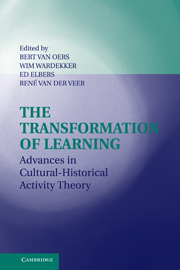Book contents
- Frontmatter
- Contents
- List of Contributors
- Preface
- INTRODUCTION
- SECTION ONE TENETS OF ACTIVITY THEORY
- SECTION TWO IDENTITY, DIVERSITY, AND INCLUSION
- SECTION THREE DYNAMICS OF ACTIVITY AND THE VARIATIONS OF LEARNING
- Introduction to Section Three: Learning in Social Settings: Challenges for Sociocultural and Activity Theory
- 15 Children's Learning through Participation in Institutional Practice: A Model from the Perspective of Cultural-Historical Psychology
- 16 Dialogue for Reasoning: Promoting Exploratory Talk and Problem Solving in the Primary Classroom
- 17 What Kinds of Tools and Resources Are Made Available to Students through Effective Guidance in a Student-Scientist Partnership Program?
- 18 Girls on the Sidelines: “Gendered” Development in Early Childhood Classrooms
- 19 Inscripting Predicates: Dealing with Meanings in Play
- 20 Pretend Play and Preschoolers
- Index
- References
16 - Dialogue for Reasoning: Promoting Exploratory Talk and Problem Solving in the Primary Classroom
Published online by Cambridge University Press: 25 August 2009
- Frontmatter
- Contents
- List of Contributors
- Preface
- INTRODUCTION
- SECTION ONE TENETS OF ACTIVITY THEORY
- SECTION TWO IDENTITY, DIVERSITY, AND INCLUSION
- SECTION THREE DYNAMICS OF ACTIVITY AND THE VARIATIONS OF LEARNING
- Introduction to Section Three: Learning in Social Settings: Challenges for Sociocultural and Activity Theory
- 15 Children's Learning through Participation in Institutional Practice: A Model from the Perspective of Cultural-Historical Psychology
- 16 Dialogue for Reasoning: Promoting Exploratory Talk and Problem Solving in the Primary Classroom
- 17 What Kinds of Tools and Resources Are Made Available to Students through Effective Guidance in a Student-Scientist Partnership Program?
- 18 Girls on the Sidelines: “Gendered” Development in Early Childhood Classrooms
- 19 Inscripting Predicates: Dealing with Meanings in Play
- 20 Pretend Play and Preschoolers
- Index
- References
Summary
INTRODUCTION
In this chapter, we present a study based on previous investigations carried out through a nine-year collaboration between the Open University, in the United Kingdom, and the National Autonomous University of Mexico. In this endeavour, we seek to understand as well as to promote diverse cognitive, discursive, and cultural processes involved in the social construction of knowledge in Mexican and British primary school children. The data reported here address the development and promotion of a particularly effective type of talk, called “exploratory talk,” as a discursive tool to facilitate social and individual reasoning in Mexican children.
Our research follows a sociocultural perspective, whose fundamentals are rooted on the seminal ideas of Lev S. Vygotsky (e.g., 1962, 1978), and which have given rise to several and varied developments that can be included in this approach, in spite of their heterogeneity (e.g., Brown and Reeve, 1987; Cole, 1985, 1996; Coll, 1990; Coll, Palacios, & Marchesi, 2001; Elbers et al., 1992; Lave, 1991; Light & Butterworth, 1992; Mercer, 1995, 2000; Newman, Griffin, & Coll, 1989; Rogoff, 1990; Wertsch, 1985a, 1985b, 1991). This perspective has produced a great number of theoretical and methodological contributions, including particularly fruitful applications to understanding development and learning, as well as promoting social and educational processes.
The sociocultural perspective assumes that cognition and other psychological phenomena are situated in and take their meaning from the social and cultural practices in which individuals participate.
- Type
- Chapter
- Information
- The Transformation of LearningAdvances in Cultural-Historical Activity Theory, pp. 319 - 341Publisher: Cambridge University PressPrint publication year: 2008
References
- 6
- Cited by



